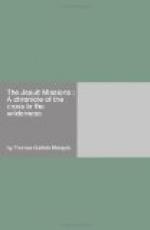Daniel and Davost arrived during the month, emaciated and exhausted, but rejoicing. The missionaries found shelter in the spacious cabin of a hospitable Huron, Awandoay, where they remained until the 19th of September. Meanwhile they had selected the village of Ihonatiria, a short distance away near the northern extremity of the peninsula, as a centre for the mission. There a cabin was quickly erected, the men of the town of Oenrio vying with the men of Teandeouiata in the task. This residence, called by Brebeuf St Joseph, was thirty-five feet long and twenty wide and contained a storehouse, a living-room and school, and a chapel.
For three years this humble abode was to be the headquarters of the missionaries in Huronia. During the first year of the mission all went smoothly. To the Indians the fathers were medicine-men of extraordinary powers; moreover, the hired men who came with them had arquebuses that would be valuable in case of attack in force by the Iroquois. Objects which the missionaries possessed inspired awe in the savages; a handmill for grinding corn, a clock, a magnifying lens, and a picture of the Last Judgment were supposed to be okies of the white man. For a time eager audiences crowded the little cabin. Few converts were made, however; for the present the savages were too firmly wedded to their customs and superstitions to accept the new okies. Unfortunately, in 1635, a drought smote the land, and the medicine-men used this calamity to discredit their rivals the black-robes. According to these fakirs, it was the red cross on the Jesuit chapel which frightened away the bird of thunder and caused the drought. Brebeuf, to disarm suspicion, had the cross painted white; yet the thunder-bird still held aloof, and the incantations and drummings of the sorcerers availed not to bring rain. Brebeuf then advised the Indians to try the effect of an appeal to his God. In despair they consented. A procession was formed and the priests said Masses and prayers. The result was dramatic. Almost immediately a sudden refreshing rain deluged the ground; the crops were saved and the medicine-men humiliated. Still, no perceptible religious progress was made. Though children came to the residence to be instructed by the black-robes, they were attracted more by the ‘beads, raisins, and prunes’ which they received as inducements to come back than by the lessons in Christian truth. For the most part the elders listened attentively to the missionaries, but to the question of laying aside their superstitions and accepting Christianity they replied: ’It is good for the French; but we are another people, with different customs.’




